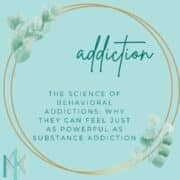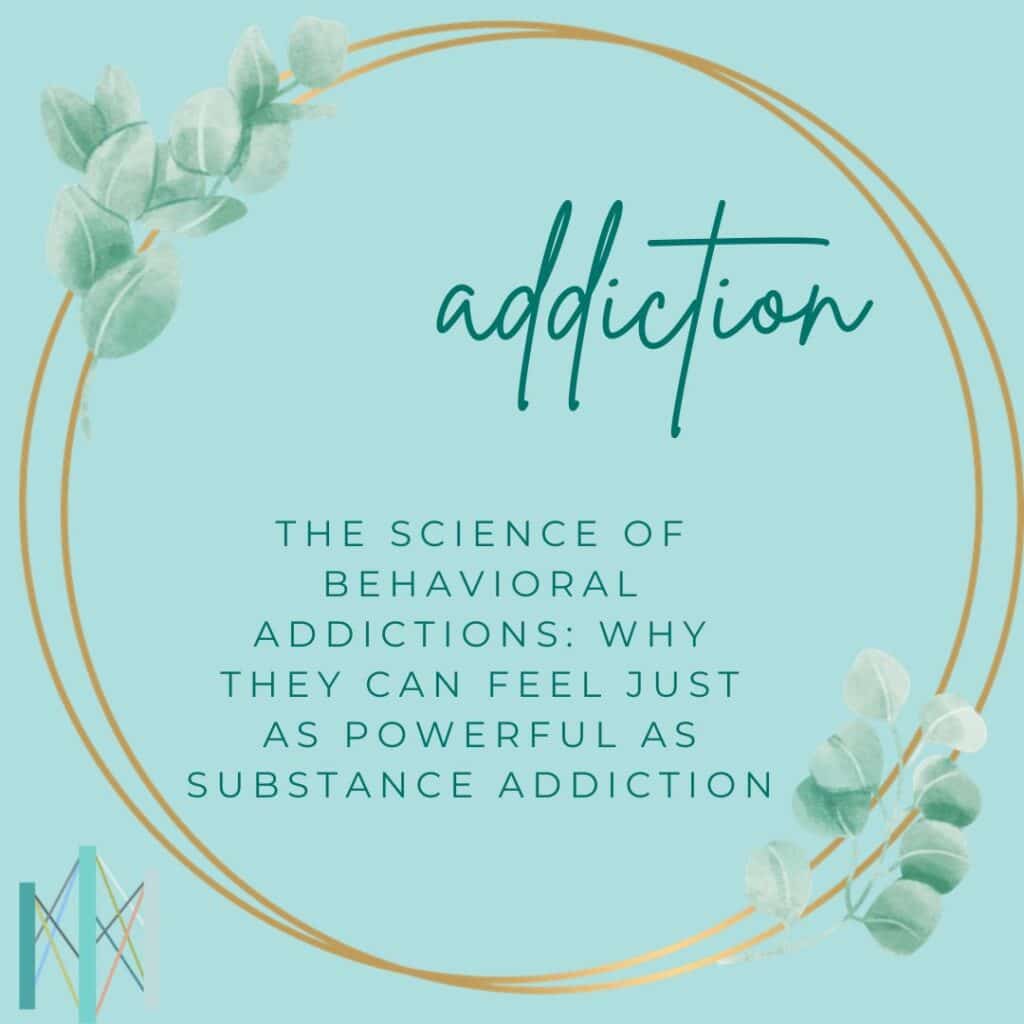
When most people hear the word addiction, they think of substance use—alcohol, drugs, nicotine, or even prescription medications. But addiction doesn’t always involve chemicals. Some behaviors, such as gambling, gaming, social media use, shopping, and even sex, can create compulsive patterns that feel just as powerful and difficult to break.
Behavioral addictions, also known as process addictions, occur when a person feels an intense, often uncontrollable urge to engage in a certain behavior, even when it starts to interfere with their daily life, relationships, or mental health. These behaviors can activate the same reward systems in the brain as drugs and alcohol, making them incredibly compelling—and sometimes just as challenging to manage.
But what does the science say? Can behavioral addictions really be as powerful as substance addictions? The answer lies in neuroscience, psychology, and the way our brains process pleasure and reward.
Browse our Therapist Directory for a California Addiction Therapist
How Behavioral Addictions Affect the Brain
The Dopamine Loop: Why Some Behaviors Become Addictive
At the core of all addictions—whether substance-based or behavioral—is dopamine, a neurotransmitter associated with pleasure, motivation, and reward. When you engage in an activity that the brain perceives as rewarding, such as winning a game, getting a social media like, or making a big purchase, your brain releases dopamine, reinforcing the behavior and making you more likely to repeat it.
For some people, this dopamine loop can become so strong that the behavior becomes compulsive. The brain begins to crave more frequent or intense experiences to achieve the same level of satisfaction, leading to a cycle of escalating engagement that mirrors substance addiction.
How Tolerance and Withdrawal Happen in Behavioral Addictions
Just like with drugs or alcohol, behavioral addictions can create tolerance—meaning that over time, the same activity produces less of a reward, leading people to engage more frequently or intensely to achieve the same level of satisfaction.
And when someone tries to stop or cut back? Withdrawal symptoms can emerge, including:
- Irritability, anxiety, or depression
- Restlessness or an inability to focus
- Strong urges or cravings to return to the behavior
- Physical symptoms like headaches, fatigue, or muscle tension
This is why people with behavioral addictions often struggle to quit, even when they recognize that their habits are negatively impacting their lives.
6 Common Types of Behavioral Addictions
While not every habit-forming behavior qualifies as an addiction, some behaviors are particularly prone to becoming compulsive due to their brain-reward connection.
1. Gambling Addiction
One of the most well-documented behavioral addictions, gambling disorder has been officially classified as an addiction in the DSM-5 (the diagnostic manual for mental health professionals). Casinos, sports betting apps, and even video games with loot boxes create high-risk, high-reward cycles that can be deeply addictive.
2. Gaming Addiction
Video games trigger highly rewarding dopamine responses, especially in competitive, immersive, or fast-paced environments. Some people become compulsive about gaming, playing for hours or even days at a time, sometimes at the expense of work, relationships, or physical health.
3. Social Media & Internet Addiction
The constant notifications, likes, and engagement from social media can create a powerful dopamine-driven feedback loop. Many people feel compelled to check their devices repeatedly throughout the day, struggling with FOMO (fear of missing out) and validation-seeking behaviors that make it hard to disengage.
Learn more about tech addiction here.
4. Shopping & Spending Addiction
Retail therapy may sound harmless, but compulsive shopping can spiral into a serious financial and emotional issue.The rush of making a purchase, combined with clever marketing tactics, can create a cycle of buying as a form of emotional regulation rather than necessity.
5. Sex & Pornography Addiction
While healthy sexual expression is normal, some individuals develop compulsive patterns around sex or pornography that interfere with relationships, self-esteem, or daily responsibilities. Pornography addiction, in particular, has been linked to changes in brain chemistry that mirror drug addiction.
Learn more about sexual addiction here.
6. Work & Productivity Addiction
In high-pressure environments like San Francisco’s tech industry, work addiction is often rewarded and even encouraged. But when work becomes compulsive—at the expense of health, relationships, or personal well-being—it can lead to burnout, anxiety, and emotional detachment.
Are Behavioral Addictions as Harmful as Substance Addictions?
While behavioral addictions don’t cause direct physical harm in the way that drugs or alcohol do, they can still lead to serious consequences, including:
- Strained relationships due to neglect, secrecy, or conflict
- Financial problems from compulsive spending or gambling
- Mental health struggles, including anxiety, depression, and low self-esteem
- Disruptions to work, school, or daily responsibilities
- Escalation into other forms of addiction (for example, a person with work addiction may turn to stimulants to maintain performance)
The good news? Behavioral addictions are highly treatable with the right support.
Symptoms of Behavioral Addictions
Behavioral addictions can sometimes be harder to recognize than substance addictions because they often involve everyday activities—work, social media, shopping, gaming—that don’t immediately seem harmful. However, when these behaviors become compulsive, difficult to control, and negatively impact daily life, they may indicate a behavioral addiction.
Common symptoms of behavioral addiction include:
1. Loss of Control
- Struggling to cut back or stop the behavior, even when you want to
- Feeling compelled to engage in the behavior, even when it’s causing harm
- Increasing time spent on the activity to achieve the same satisfaction
2. Preoccupation & Cravings
- Thinking about or anticipating the behavior when you’re not engaging in it
- Feeling restless, anxious, or irritable when unable to do it
- Planning daily activities around the behavior
3. Emotional Regulation Through the Behavior
- Using the behavior as an escape from stress, anxiety, depression, or boredom
- Engaging in the activity to avoid difficult emotions rather than for enjoyment
- Feeling a temporary high, relief, or emotional numbness when doing it
4. Negative Consequences in Daily Life
- Neglecting work, relationships, or responsibilities due to the behavior
- Experiencing conflict with family or friends about time spent on the activity
- Financial or health consequences (e.g., excessive spending, sleep deprivation)
5. Tolerance & Withdrawal
- Needing to increase time or intensity to feel the same level of satisfaction
- Feeling agitated, anxious, or emotionally low when unable to engage in the behavior
- Attempting to quit but relapsing and returning to compulsive use
Behavioral addictions can affect anyone, regardless of age, background, or profession. While they don’t involve physical substances, the brain’s dopamine-driven reward system makes them just as difficult to break. Therapy can provide tools to regain balance and retrain the brain’s relationship with these behaviors.
How Therapy Can Help with Behavioral Addictions
Just like with substance addictions, behavioral addictions aren’t about willpower—they’re about patterns of reinforcement in the brain that can be changed with the right approach. Therapy can help by:
- Identifying emotional triggers that drive compulsive behaviors
- Rewiring thought patterns through Cognitive Behavioral Therapy (CBT) and Mindfulness-Based Interventions
- Addressing underlying mental health conditions, such as anxiety, depression, or trauma
- Developing healthier coping strategies to replace compulsive behaviors
- Improving relationships and communication if addiction has caused interpersonal strain
If you feel stuck in compulsive patterns of behavior and want to regain control, working with a therapist can help you break free from cycles that no longer serve you.
Browse our therapist directory or contact us to begin working with a therapist who understands behavioral addiction, technology use, and emotional well-being.
You Might Also Like to Read:
- 50 Practical Ways to Set Healthier Screen Boundaries Without Disconnecting Completely
- Can You “Detox” from Tech Without Hurting Your Career or Social Life?
- The Digital Age Dilemma: Navigating ADHD in a Hyperconnected World




